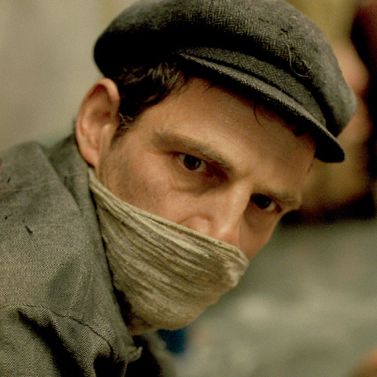
How do you remain human in an environment so horrific that you’re forced to carry the dead bodies of people just like you in order to buy a few months before your own inevitable execution? From its description in the Cannes screening schedule, Son of Saul didn’t seem like a movie most journalists needed to rush out to watch: another Holocaust movie, this one by a first-time Hungarian director, László Nemes, with a lead actor, Géza Röhrig, who was also making his film debut. And yet, it has become the movie at Cannes mentioned most often in conversations about what will win the Palme d’Or. There was a predictor, though: Debut films rarely get chosen for the main competition at Cannes unless they’re extraordinary. A day and a half after watching it, I’m still having flashbacks.
This is a Holocaust film like none you’ve ever seen before. We first meet Saul as he stumbles into focus in Nemes’s narrow 35mm frame, and the camera is never more than inches away from him for the next frenetic hour and 47 minutes. His eyes dart around as he pushes his way through a chaos of truckloads of new arrivals, weakened and swaddled in rags, to this hell of a prison camp. Now he’s in a concrete room where a voice is barking at the new arrivals to remove their clothes for a shower and disinfection. For a split second, you think Saul may be among them, until he, too, begins hurrying them to get undressed. A stream of naked people run past him, out of focus. The door closes behind them, and the screams begin.
Only then do you realize that this is not a shower but a gas chamber. It is Auschwitz, 1944. The Allies’ encroachment has required increased urgency: More transports, swifter purging. Saul, we learn, is a member of the Sonderkommando, or bearers of secrets, who are given higher food rations and spared, momentarily, for doing the Nazis’ dirtiest work. We are with Saul, rifling through the clothes of the doomed for jewelry and gold. We are with him on the concrete floor, scrubbing the vomit and blood. We are with him dragging “pieces,” as the Nazis call bodies, to the incinerator. And we are with him as he spots the corpse of a young boy who he believes to be his son.
That the film opens with the gas chamber may give you a sense of where it goes. It is relentless, made watchable only because the most horrific acts occur in the out-of-focus periphery of Saul’s vision, or just within earshot. Nemes was acclaimed auteur Béla Tarr’s assistant for two years, and his deep focus on Saul mirrors Saul’s obsession with rescuing the body of that young boy and finding a rabbi for a proper burial, whatever the cost to himself and a fomenting rebellion among the Sonderkommando, who have discovered they have just days left to live. “You have failed the living for the dead,” he is told by a fellow prisoner, and that frustration is palpable. Why can’t Saul leave the dead boy to save himself or to save his compatriots? But that is a question for those of us living in a world with empathy and logic. What Son of Saul reveals in excruciating minute after excruciating minute is that, for this man who is all but dead, a single act of morality and religious tradition — however reckless and potentially fatal — is his only chance for survival.

